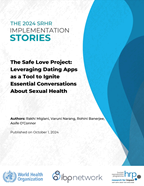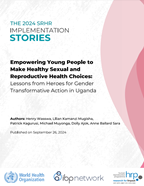WHO/IBP Network: A global platform for local impact
About
With over 120 member organizations representing international non-governmental organizations (NGOs), local civil society organizations (CSOs), academia, and others, the IBP Network convenes partners to share best practices, experiences and tools to support family planning and sexual and reproductive health and rights programming. IBP focuses on supporting knowledge exchange, documentation, and implementation research efforts. The IBP Network is supported by USAID, UNFPA and WHO.
Vision – Global FP/SRH guidelines and effective practices are disseminated and implemented to improve reproductive health outcomes around the world.
Mission – To support the dissemination and use of evidence-based guidelines and programmatic interventions in SRH through IBP’s convening power, diverse membership and neutral platform for knowledge-sharing and collaboration.
What is the WHO/IBP Network?
An introductory video.
Wo we are
The IBP Secretariat
The IBP Secretariat is hosted by the Department of Sexual and Reproductive Health and Research (SRH) at WHO in Geneva, Switzerland.
Nandita Thatte: thatten@who.int
Ados May: maya@who.int
IBP Steering Committee and Co-Chairs
In 2020 the IBP Network restructured the Steering Committee and Chair to reflect a more diverse membership and shift power to more locally led institutions and partners. The Steering Committee acts as a strategic and governing board providing strategic guidance to the Steering Committee and the Secretariat. The IBP Chair leads the IBP Steering Committee and offers strategic direction to the IBP Secretariat.
The IBP Co-Chairs
Young and Alive Initiative Tanzania (until October 2026)
Sesilia Shirima: sshirima@youngandalive.org
Clara Maliwa: claramaliwa@youngandalive.org
IBP Committee Members
- Alan Jarandilla, Nunez International Youth Alliance for Family Planning (IYAFP)
- Alessandra Aresu, Humanity and Inclusion
- Amanda Cordova-Gomez, USAID
- Amany Qaddour, Syria Relief and Development
- Cristina Bisson, RTI International
- Pearson Malisau, Center for Girls Education, Malawi
- Erika Martin, Independent Consultant
- Emily Peca, University Research Center (URC)
- Gifty Addico, UNFPA, Nigeria
- Gail Knudson, World Professional Association for Transgender Health (WPATH)
- Gathari Ndirangu, Jhpiego Kenya
- Hala Naufal, Lebanese Family Planning Association
- Joe Thomas, Editor- in-Chief: Critical Public Health UK
- Kate Dieringer, USAID
- Karthik Srinivasan, Child Investment Fund
- Mary Jane Lacoste, Jhpiego Indonesia
- Nihal Said, International Planned Parenthood Federation
- Poonam Muttreja, Population Foundation India
- Sarah Boateng, Investing in Girls Education Africa (IGEA)
- Sara Mazursky, Johns Hopkins Center for Communications Programs (CCP)
- Wendy Castro, University Research Center (URC)
- Jennie Greaney UNFPA
- Sarah Brittingham (FHI 360)
- Kirsten Krueger (FHI 360)
How we Work
As a consortium, we rely on our partners to help shape our agenda and lead our work. We focus on active dissemination efforts through virtual and in person platforms, we support the use of evidence through our communities of practices and innovative strategies like storytelling and tool development and we advance the science and art of equitable partnerships through our shared governance and leadership structures.
Communities of practice
We host over 20 active communities of practice on various SRHR technical topics some of which include: Adolescent sexual and reproductive health, Global fertility care, Male contraception, Comprehensive abortion care, Group care, Method choice, IBP Francophonie, IBP América y el Caribe.
Join our Global Listserv or a Community of Practice Contact us and get involved
The science and art of equitable partnership
The IBP Network launched a community of practice on shifting power in SRHR. This community which has over 800 members aims to question and highlight current power dynamics and structures in global health partnerships and offer solutions to a new way of working.
Implementation stories

The Safe Love project: leveraging dating apps as a tool to ignite essential conversations about sexual...
Across the globe, WHO evidence-based guidelines are transforming sexual and reproductive health, empowering communities with knowledge and care. These...

The Jeunes en Vigie program: how a feminist approach to social auditing is shaping a more accountable...
In the context of health, social auditing involves the systematic assessment of healthcare services by the very people who use them and identifying gaps,...

Empowering young people to make healthy sexual and reproductive health choices: lessons from heroes for...
Across the globe, WHO evidence-based guidelines are transforming sexual and reproductive health, empowering communities with knowledge and care. These...
Feature story
Articles & blogposts
Nandita Thatte, Bringing Personal Experience with Sexual and Reproductive Health to Work, 16 April 2023
Carolin Ekman, Nandita Thatte, Opinion: Turning storytelling challenges into strengths to advance SRH, 30 January 2023.
Devex Partnerships, Opinion: Beyond the buzz words: 'DEI' and 'decolonizing' global health, 14 December 2022.
Carolin Ekman, Ados Velez May, Nandita Thatte, Opinion: How to use storytelling to capture reproductive health evidence, 25 October 2021.
Ados Velez May, Carolin Ekman, Nandita Thatte, Opinion: The value of webinars in SRHR, 13 December 2021
Thatte N, Cuzin-Kihl A, May AV, D'Adamo M, Addico G, Kiarie J, Askew I. Leveraging a Partnership to Disseminate and Implement What Works in Family Planning and Reproductive Health: The Implementing Best Practices (IBP) Initiative Glob Health Sci Pract. 2019 Mar 29;7(1):12-19.
